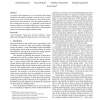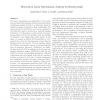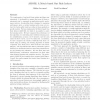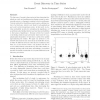125
click to vote
SDM
2009
SIAM
15 years 11 months ago
2009
SIAM
We propose Link Propagation as a new semi-supervised learning method for link prediction problems, where the task is to predict unknown parts of the network structure by using aux...
129
click to vote
SDM
2009
SIAM
15 years 11 months ago
2009
SIAM
This paper demonstrates the applicability of the recently proposed supervised dimension reduction, hierarchical linear discriminant analysis (h-LDA) to a well-known spatial locali...
108
Voted
SDM
2009
SIAM
15 years 11 months ago
2009
SIAM
In this paper we explore avenues for improving the reliability of dimensionality reduction methods such as Non-Negative Matrix Factorization (NMF) as interpretive exploratory data...
126
click to vote
SDM
2009
SIAM
15 years 11 months ago
2009
SIAM
Process Mining refers to the extraction of process models from event logs. Real-life processes tend to be less structured and more flexible. Traditional process mining algorithms...
111
click to vote
SDM
2009
SIAM
15 years 11 months ago
2009
SIAM
The requirements of real-world data mining problems vary extensively. It is plausible to assume that some of these requirements can be expressed as application-specific performan...
SDM
2009
SIAM
15 years 11 months ago
2009
SIAM
The discovery of events in time series can have important implications, such as identifying microlensing events in astronomical surveys, or changes in a patient’s electrocardiog...
127
click to vote
SDM
2009
SIAM
15 years 11 months ago
2009
SIAM
Complex systems exhibit emergent patterns of behavior at different levels of organization. Powerful network analysis methods, developed in physics and social sciences, have been s...
129
Voted
SDM
2009
SIAM
15 years 11 months ago
2009
SIAM
Query-oriented summarization aims at extracting an informative summary from a document collection for a given query. It is very useful to help users grasp the main information rel...
121
click to vote
SDM
2009
SIAM
15 years 11 months ago
2009
SIAM
We introduce FuncICA, a new independent component analysis method for pattern discovery in inherently functional data, such as time series data. FuncICA can be considered an analo...
SDM
2009
SIAM
15 years 11 months ago
2009
SIAM
Most existing work on Privacy-Preserving Data Mining (PPDM) focus on enabling conventional data mining algorithms with the ability to run in a secure manner in a multi-party setti...




